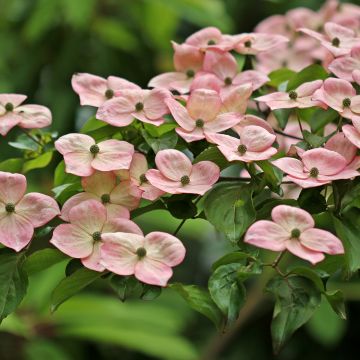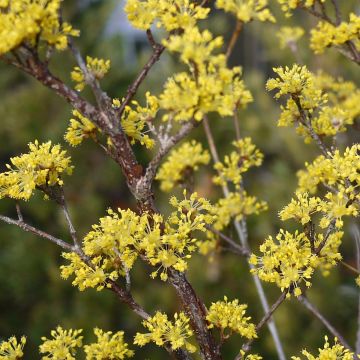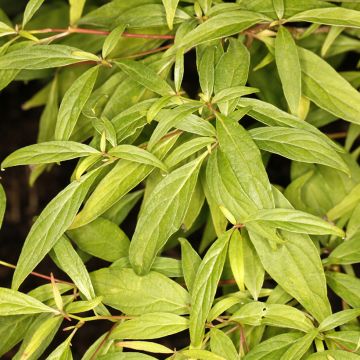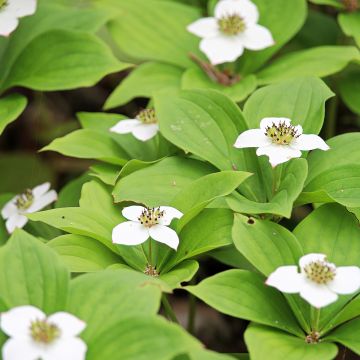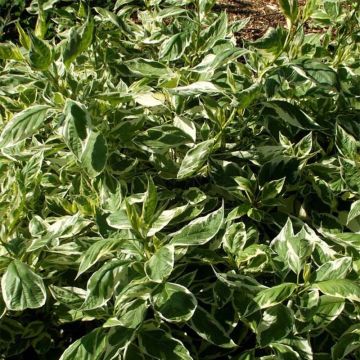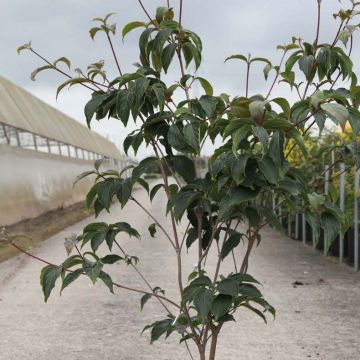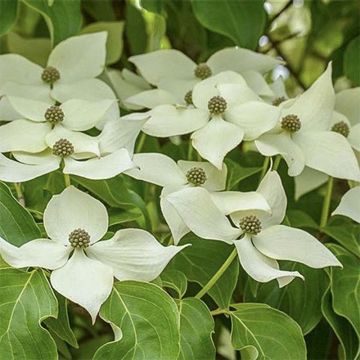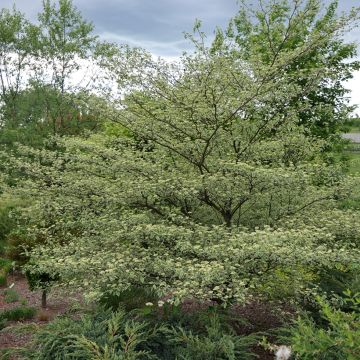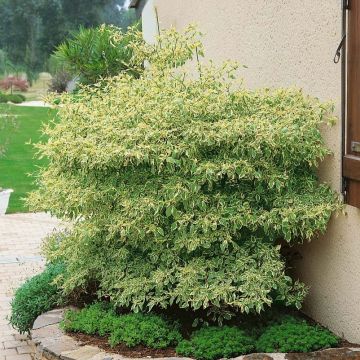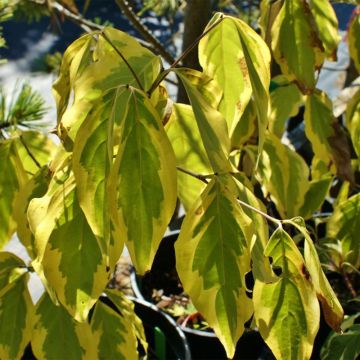

Cornus Blooming White Tetra - Flowering Dogwood
Cornus Blooming White Tetra - Flowering Dogwood
Cornus kousa x angustata Blooming White Tetra
Chinese dogwood, Flowering dogwood
This item cannot be shipped to the selected country
Oversize package delivery charge from €6.90
More information
Schedule delivery date,
and select date in basket
This plant carries a 24 months recovery warranty
More information
We guarantee the quality of our plants for a full growing cycle, and will replace at our expense any plant that fails to recover under normal climatic and planting conditions.
Oversize package: home delivery by special carrier from €6.90 per order..
Express home delivery from €8.90.
Does this plant fit my garden?
Set up your Plantfit profile →
Description
Cornus 'Blooming White Tetra' is a hybrid dogwood variety with a compact habit that is highly decorative with its white flowering and semi-evergreen foliage that blazes until late in the season. Well-suited for small spaces, this bush also produces beautiful edible fruits, much to the delight of birds. Very hardy and less demanding to grow than its parent, Cornus kousa, and its cousin, C. florida, it undoubtedly deserves to be discovered. Give it a prominent place, preferably in partial shade, in a large shrub bed and in non-chalky soil.
The 'Blooming White Tetra' Cornus is part of a new series of hybrids resulting from the cross-breeding of Cornus kousa, a deciduous variety, with C.angustata, which has evergreen foliage. This series, called 'Blooming Tetra', brings together cultivars with a modest stature with well-branched, semi-evergreen foliage, which produce large "flowers" and large fruits. Their foliage takes on orange to red tones early in autumn and the spectacle lasts for several weeks. All these plants belong to the dogwood family.
It is a small tree that generally reaches 2.50 m (8 ft 2 in) in height and 1.50 m (4 ft 11 in) in width at the age of 10. Ultimately, it will reach approximately 3 m (9 ft 10 in) in height and 2.50 m (8 ft 2 in) in spread, depending on the growing conditions. This cultivar shows rather slow growth. The flowering takes place in May-June when the bush is covered with a multitude of 'flowers', which are actually inflorescences measuring 8-9 cm (3.1-3.5 in) in diameter. These are clusters of small, green true flowers, surrounded by 4 pointed bracts, forming a star. Their colour is pure white and does not change over the course of the approximately 6 weeks that these bracts live. These inflorescences are arranged on the tree as if they were placed on the foliage. The flowers are followed by pink to carmine-red fruits, similar to strawberries. The higher the summer temperatures, the more abundant the fruiting. The fruits are edible, fleshy and sweet in taste. They are not very tasty, but they enhance the charm of the bush at the end of the season. This dogwood is also remarkable thanks to its young shoots tinged with purple. The leaves are ovate, strongly veined, slightly wavy on the edges and medium green. They turn to beautiful orange and then red colours in autumn and partially persist on the branches.
The 'Blooming White Tetra' Cornus thrives in continental climates with pronounced summers and winters, but also performs well in milder areas. In hot regions, it should be sheltered from scorching sun. This dogwood is beautiful and deserves to be planted in isolation, standing out in a small garden or a large shrub bed. Many ericaceous plants and shrubs with staggered flowering can accompany it. Choose, for example, oakleaf hydrangeas or paniculate hydrangeas, Japanese maples with purple foliage, a Japanese Styrax, etc.
Report an error about the product description
Plant habit
Flowering
Foliage
Botanical data
Cornus
kousa x angustata
Blooming White Tetra
Cornaceae
Chinese dogwood, Flowering dogwood
Cultivar or hybrid
Other Cornus
Planting and care
The Blooming Tetra Cornus thrives in continental climates, as well as in temperate regions. Extremely cold temperatures during winter can cause a reduction in flowering. However, this bush is very hardy and can withstand frost of at least -15°C (5°F). It tolerates sunny exposures in areas with moderately warm summers. In hotter regions, it should be planted in a sheltered spot away from scorching sun.
It prefers deep, fertile, well-drained soils that are slightly acidic or neutral, rich in humus, and low to very low in limestone. It can tolerate clayey soils as long as they are not waterlogged, especially in winter. Plant it in a deep, well-prepared hole, lined with clay balls, coarse sand, or gravel to ensure good drainage in very clayey soil. At planting, add compost and leaf mold. Mulching with pine bark will help maintain moisture and promote soil acidity.
Pruning is not essential, but can be done at the end of winter to remove diseased or dead wood and crossing branches in order to maintain an attractive habit. During the first two years after planting, regular watering is necessary in summer, after that it can manage on its own, in moderate climates.
Planting period
Intended location
Care
This item has not been reviewed yet - be the first to leave a review about it.
Haven't found what you were looking for?
Hardiness is the lowest winter temperature a plant can endure without suffering serious damage or even dying. However, hardiness is affected by location (a sheltered area, such as a patio), protection (winter cover) and soil type (hardiness is improved by well-drained soil).

Photo Sharing Terms & Conditions
In order to encourage gardeners to interact and share their experiences, Promesse de fleurs offers various media enabling content to be uploaded onto its Site - in particular via the ‘Photo sharing’ module.
The User agrees to refrain from:
- Posting any content that is illegal, prejudicial, insulting, racist, inciteful to hatred, revisionist, contrary to public decency, that infringes on privacy or on the privacy rights of third parties, in particular the publicity rights of persons and goods, intellectual property rights, or the right to privacy.
- Submitting content on behalf of a third party;
- Impersonate the identity of a third party and/or publish any personal information about a third party;
In general, the User undertakes to refrain from any unethical behaviour.
All Content (in particular text, comments, files, images, photos, videos, creative works, etc.), which may be subject to property or intellectual property rights, image or other private rights, shall remain the property of the User, subject to the limited rights granted by the terms of the licence granted by Promesse de fleurs as stated below. Users are at liberty to publish or not to publish such Content on the Site, notably via the ‘Photo Sharing’ facility, and accept that this Content shall be made public and freely accessible, notably on the Internet.
Users further acknowledge, undertake to have ,and guarantee that they hold all necessary rights and permissions to publish such material on the Site, in particular with regard to the legislation in force pertaining to any privacy, property, intellectual property, image, or contractual rights, or rights of any other nature. By publishing such Content on the Site, Users acknowledge accepting full liability as publishers of the Content within the meaning of the law, and grant Promesse de fleurs, free of charge, an inclusive, worldwide licence for the said Content for the entire duration of its publication, including all reproduction, representation, up/downloading, displaying, performing, transmission, and storage rights.
Users also grant permission for their name to be linked to the Content and accept that this link may not always be made available.
By engaging in posting material, Users consent to their Content becoming automatically accessible on the Internet, in particular on other sites and/or blogs and/or web pages of the Promesse de fleurs site, including in particular social pages and the Promesse de fleurs catalogue.
Users may secure the removal of entrusted content free of charge by issuing a simple request via our contact form.
The flowering period indicated on our website applies to countries and regions located in USDA zone 8 (France, the United Kingdom, Ireland, the Netherlands, etc.)
It will vary according to where you live:
- In zones 9 to 10 (Italy, Spain, Greece, etc.), flowering will occur about 2 to 4 weeks earlier.
- In zones 6 to 7 (Germany, Poland, Slovenia, and lower mountainous regions), flowering will be delayed by 2 to 3 weeks.
- In zone 5 (Central Europe, Scandinavia), blooming will be delayed by 3 to 5 weeks.
In temperate climates, pruning of spring-flowering shrubs (forsythia, spireas, etc.) should be done just after flowering.
Pruning of summer-flowering shrubs (Indian Lilac, Perovskia, etc.) can be done in winter or spring.
In cold regions as well as with frost-sensitive plants, avoid pruning too early when severe frosts may still occur.
The planting period indicated on our website applies to countries and regions located in USDA zone 8 (France, United Kingdom, Ireland, Netherlands).
It will vary according to where you live:
- In Mediterranean zones (Marseille, Madrid, Milan, etc.), autumn and winter are the best planting periods.
- In continental zones (Strasbourg, Munich, Vienna, etc.), delay planting by 2 to 3 weeks in spring and bring it forward by 2 to 4 weeks in autumn.
- In mountainous regions (the Alps, Pyrenees, Carpathians, etc.), it is best to plant in late spring (May-June) or late summer (August-September).
The harvesting period indicated on our website applies to countries and regions in USDA zone 8 (France, England, Ireland, the Netherlands).
In colder areas (Scandinavia, Poland, Austria...) fruit and vegetable harvests are likely to be delayed by 3-4 weeks.
In warmer areas (Italy, Spain, Greece, etc.), harvesting will probably take place earlier, depending on weather conditions.
The sowing periods indicated on our website apply to countries and regions within USDA Zone 8 (France, UK, Ireland, Netherlands).
In colder areas (Scandinavia, Poland, Austria...), delay any outdoor sowing by 3-4 weeks, or sow under glass.
In warmer climes (Italy, Spain, Greece, etc.), bring outdoor sowing forward by a few weeks.

































